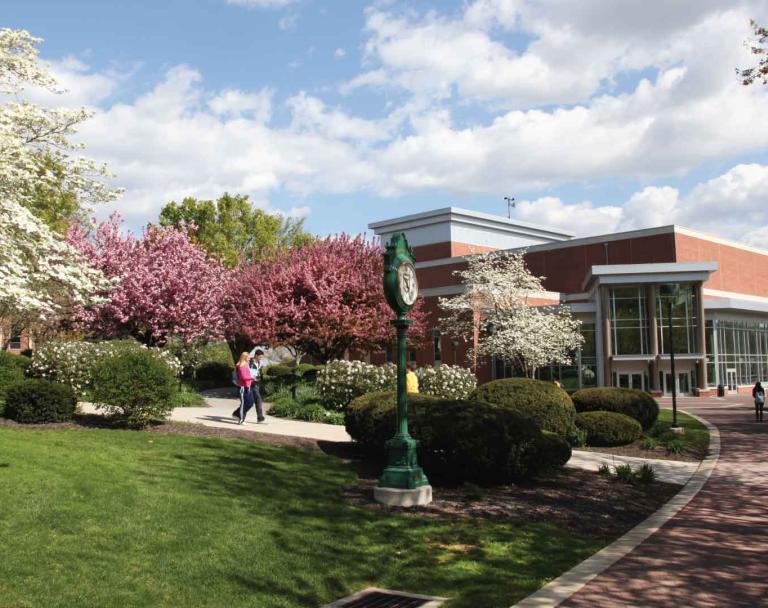Sean Messett

Combat Veteran Found Community at York College
Sean Messett ’19 left the Army with a Purple Heart, post-traumatic stress disorder (PTSD), and brain injuries. After finding support at York College, he wants to start a nonprofit to aid other veterans.
The documented cause of Sean Messett’s military career-ending traumatic brain injury was an improvised explosive device (IED) in Afghanistan. But that was just the tipping point, the last of many brain injuries the Army combat veteran suffered fighting in Afghanistan and Iraq.
After serving his country for five years, he came home in 2013 with a Purple Heart, PTSD, and an array of physical and emotional scars.
For Messett ’19, the next four years were marked by fits and starts—temporarily finding his footing only to be pulled back underwater, consumed by nightmares, survivor’s guilt, post-traumatic stress, and the lingering physical toll of brain injuries.
“It was really a hellish couple of years,” he says.
It wasn’t until he connected with a Hanover nonprofit, For the Love of a Veteran, and enrolled at York College of Pennsylvania that he found stability, a sense of community, and purpose. Now Messett is pursuing a Master’s degree in Non-profit Administration at the University of Notre Dame, the next step toward starting his own nonprofit to help veterans like him find the support they need.
Finding relief
“You have a plan and life punches you in the face,” Messett says.
After retiring from the Army, he struggled to find purpose. He had two false starts at other colleges (both disasters, he says) and opened, then closed, a CrossFit gym. He’d seek help and find support with veterans’ groups, but the assistance seemed short-term, and inevitably his PTSD and brain injuries would put him back at square one.
When he found For the Love of a Veteran and received Stellate Ganglion Block treatment, there was an instantaneous lifting of the weight he’d been carrying around for four years.
“It felt like you dropped your rucksack,” Messett says of the injection to relieve pain in the head, neck, upper arm, and upper chest. It’s not a miracle cure. He still gets triggered and has nightmares. But it quieted his constant fight-or-flight response, allowing him to feel grounded and in the moment, able to appreciate therapy and, for the first time since his return to civilian life, to feel an emotional connection with his young daughter, Rosalie.
Finding community
Messett was honest with the faculty at York College. He still struggled with memory, concentration, and emotional boundaries. And faculty members were honest with him. They were there to help in any way they could, they told him.
“They absolutely lived by their word,” he says. “The people who are at York College are genuine. When they say they’re going to do something for you they follow through.”
Outside of the Army it was difficult for Messett to trust, to find common bonds. But at York College he found what he was looking for.
“I absolutely found that community at York College,” he says. “They’re genuine and they really want you to be successful.”
Messett was a nontraditional student in almost every way. He was a 35-year-old combat veteran covered in tattoos, one of just two males in the Human Services program at the time. But he was welcomed with open arms, including at a campus lounge just for veterans, and by faculty and staffers who had combat experience.
“They were more than willing to open up their ears and listen,” he says.
Finding a purpose
As the years went on, Messett’s new purpose came into focus: He wanted to help other veterans find community and support. But the more he interacted with various organizations, the more he began to see how he would do things differently.
“I just see this generation of war fighters being left behind,” he says. Instead of working within these systems, he decided to create his own organization.
As he pursues his master’s degree, Messett is learning how to obtain grants and to push to change state and local legislation while gaining the technical skills to build the nonprofit he wishes had been there for him.
Messett dreams of creating a community that brings veterans together to support one another. A place where all can get the treatment they need, when they need it. A place where a veteran can walk in and say, “I need to talk to someone,” and a person who understands will be there to listen. A place where veterans can drop their rucksacks and feel the weight they’ve been carrying for years finally being lifted.

